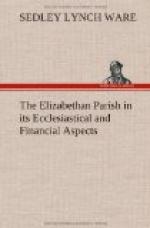Among the churchwardens’ principal obligations, as laid down in the injunctions and articles they were sworn to observe, was the keeping in repair of the church fabric and its appurtenances, as well as the procuring and the maintaining in good condition of the church “furniture,” a term which in the language of the time included all the necessaries for worship and the celebration of the sacraments: church linen, surplices, the communion cup, the elements themselves, bibles, prayer books, the writings of authorized commentators on the Scriptures, or the works of apologists for the Anglican Church; tables of consanguinity and other official documents enjoined to be kept in every parish by the diocesan.[23]
The visitation act-books of the period abundantly show the processes employed by the ecclesiastical authorities in enforcing these and other duties (which will be detailed in their turn), and prove that the courts Christian were emphatically administrative as well as judicial bodies. To show these courts at work it will be necessary to give a number of illustrative examples taken from the visitation entries. Thus the wardens of Childwall, having been presented at the visitation of the bishop of Chester, 9th October, 1592, because their church “wanteth reparac[i]on,” are excommunicated for not appearing. On a subsequent day John Whittle, who represents the wardens, informs the court that the repairs have been executed. Thereupon the wardens are absolved and the registrar erases the word “excommunicated” from the act-book.[24] At the same visitation the wardens of Aughton are presented because “there bible is not sufficient, they want the first tome of the homilies, Mr. Juells Replie and Apologie[25] [etc.]....” The two wardens are enjoined by the judge to buy a sufficient bible and to certify to him that they have done so.
But—so careful is the supervision over parish affairs—mere certification by vicar or wardens that a certain article has been procured in obedience to a court order will not always suffice. If the thing can be produced in court the judge often orders it to be brought before him for personal inspection. Accordingly, when at the visitation of the chancellor of the bishop of Durham, the 13th March, 1578/1579, the wardens of Coniscliffe are found to “lacke 2 Salter bookes [and] one booke of the Homelies,” they are admonished to certify “that they have the books detected 4th April and to bringe their boks hither."[26] Thus, too, the wardens of St. Michael’s, Bishop Stortford, record in 1585 that they have paid 8d. “when we brought in to the court the byble and comunion booke to shewe before the comysary."[27] There is a curious entry in the same accounts some years earlier, viz.: “pd for showing [shoeing] of an horse when mr Jardfield went to london to se wether it was our byble that was lost or no and for his charges...."[28]




